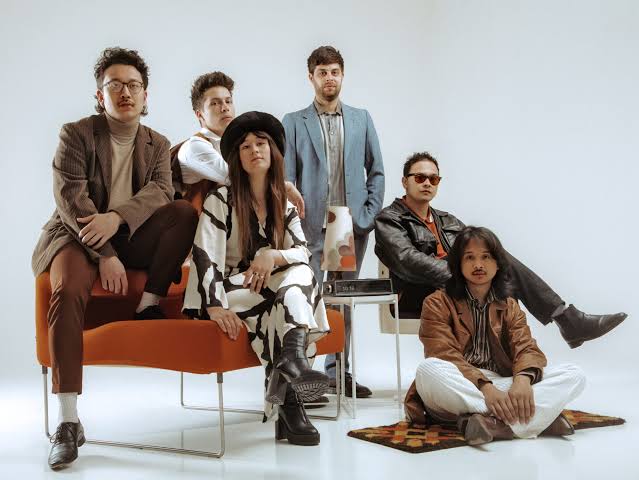Rooted in the rich musical traditions of Indonesia and carried by a deep connection to their heritage, Nusantara Beat is rapidly gaining momentum. Not just in the Netherlands, but across Indonesia and Southeast Asia. With their debut album on the horizon and their first full club tour in the Netherlands planned for this fall, the band is turning ancestral memory into a contemporary force. Their sound blends hypnotic grooves, warm vintage textures and Southeast Asian scales. In this interview, drummer Sonny Groeneveld shares how Nusantara Beat started out of curiosity, but grew into a serious project bridging continents and cultures.
⸻
Introduction
What does the name ‘Nusantara Beat’ mean?
“Nusantara” is a Sanskrit word used to describe the Indonesian archipelago. Everyone in the band has ties to that region. My grandparents are from Indonesia, our bassist Michael was born in Bandung, and my brother, who also plays in the band, shares my heritage of course. Each member’s connection to Indonesia might differ in intensity, but the collective identity is strong. “Beat” refers to the rhythm-driven, 60s and 70s-inspired sound that runs through our music. It’s a nod to that vintage era of Indonesian pop and soul that inspires us deeply.
How would you describe your sound to someone who’s never heard your music?
There’s a mystical, almost cinematic tone to our melodies. Something modal, mysterious, and evocative. But at the same time, the grooves are heavy, danceable, even a bit dangerous. We like to think of it as nostalgic and psychedelic Indonesian groove music.
What themes or stories do you explore through your songs?
At first, we focused on reinterpreting traditional songs. Many of them deal with timeless themes: food, love, the land, or human connection and collaboration. There’s often a melancholic or moody tone, but not because the lyrics are sad, it’s more about a cultural temperament and the sounds people are attracted to. A song about cooking can still sound deep and mysterious. As we started writing our own material, those same themes stayed present. One song, for example, uses a volcano eruption as a metaphor for inner fire and emotional eruption. Others reflect on family, memory, or ancestral connection. So yes, earthy, grounded topics, always with a spiritual or nostalgic undertone.
⸻
Roots
How did Nusantara Beat start?
It started about three years ago as a project among friends with shared roots and curiosity. We didn’t even plan to perform at first, we just wanted to explore Indonesian music, jam a bit, and see what happened. But things escalated quickly: live shows followed, and before we knew it, we were a band. Once we got on stage and felt the energy, we knew we had to take it further. That’s when we started writing our own songs, and now we’re here just a few months before the release of our first album.
What musical influences have shaped your sound beyond traditional Indonesian music?
There’s a broad range. Many of us grew up listening to 60s rock, both Western and Indo-Dutch. In the Netherlands the Tielman Brothers are quite popular. Personally, I was influenced by sounds from LA and New York, like El Michels Affair and bands related to the Daptone label.And more recently, bands like Glass Beams. Each member brings different inspiration, our bassist is into Black Sabbath, for example. Our sound brings together many styles, but it’s always shaped by our Indonesian roots.
Do you incorporate traditional Indonesian instruments in your music?
Absolutely. My mother and aunt were Balinese dancers and brought back traditional instruments from Indonesia: gamelan, gongs, and more. We do not bring these instruments on stage, but sample these sounds and play them through modern tools like MPCs, blending ancient timbres with modern production. We’ve also used the vibraphone, which has a gamelan-like tone, but always mixed with synths and western instruments. And when we were in Bandung, Indonesia, we visited an instrument maker that builds the kecapi, an instrument tuned to traditional Javanese scales like pelog and slendro, which immediately gives our music that Indonesian feeling.
How do you approach the song writing process?
It really depends. Sometimes we write individually at home, just working on small ideas or riffs. Other times, something will spark during a soundcheck. We’re just playing around together, and suddenly there’s this moment where someone grabs their phone to record what’s happening. That’s how quite a few ideas have started. We also work in small groups outside of rehearsal, then bring those ideas back to the studio to shape them as a band. More recently, we’ve been diving into specific musical styles: studying rhythms, scales, vocal approaches, and how songs are structured. That research often leads to new inspiration, and from there, things just start to unfold naturally.
Do you always stay within Indonesian traditions or do you explore beyond?
Indonesia remains our foundation, our anchor. It’s what unites us and where we draw most of our inspiration from, culturally and musically. But naturally, as musicians with different backgrounds and tastes, other influences sneak in. Right now, we’re still mostly focused on exploring the depth and variety within Indonesian music itself, there’s still so much to learn and rediscover.
Are there big musical differences between the various Indonesian islands?
Absolutely. Even within one island like Java, you’ll find huge variation. For example, in the Sunda region, where some of our band members have family roots, they speak a different language and the music has a very distinct sound. A lot of Sundanese pop comes from that area, and that’s a big influence on what we’re doing now. But then you also have styles like dangdut, which is totally different. It was heavily influenced by Bollywood films that became popular in Indonesia decades ago, and people started recreating that sound locally. It led to a whole new genre with its own vibe. There’s a great Instagram page called Aural Archipelago that shares amazing clips from remote villages in places like Sumatra or Borneo. You’ll see older people making music with pots and pans, totally unique and really inspiring.
⸻
Live
What do you aim to bring to the audience during your live shows?
For many in the crowd, it might be their first exposure to Indonesian music. So part of our mission is to surprise and showcase those sounds. We want to create a energetic space that’s both nostalgic and ecstatic. What’s been really special is seeing people with Indonesian heritage bring their parents or relatives to our shows, creating a beautiful generational connection. But at the end of the day, we’re also just a live band. It’s not meant to be a history lesson. It’s meant to be fun.
Is there a live moment that stuck with you?
Playing Synchronize Festival in Jakarta was unforgettable. Thousands of people gathered around the stage, singing along to songs they remembered from their childhood, even crowd-surfing by the end. It was a powerful affirmation. Earlier, we also played a university courtyard in Yogyakarta to anthropology students an intimate but deeply moving experience. Many told us afterwards they felt inspired to reconnect with their musical heritage. That was incredibly meaningful. We’ve been told that not many young people in Indonesia are into this music anymore, but we feel humbled to play our part in honoring the amazing music of this country.
Do live shows in Indonesia feel very different compared to the Netherlands?
Yes, definitely. In the Netherlands – and in Europe in general – there’s a very structured infrastructure for festivals and club shows. Everything is super organized. In Indonesia, that structure is still developing. There are big festivals and major concerts, but doing a full tour is a completely different experience. You might end up playing in theaters or more improvised venues. The club circuit, at least from what I’ve seen so far, is less established. So yeah, it’s a different world in terms of how live music is set up and experienced.
⸻
Inspires
What’s next for Nusantara Beat?
We’re releasing our debut album this fall, with a tour across the Netherlands and other European countries to support it. We’ve also recorded live video sessions including a version of “Sifat Manusia,” a classic dangdut track reinterpreted in our own style. After that? More writing, more exploring, and hopefully more trips back to Indonesia and beyond.

